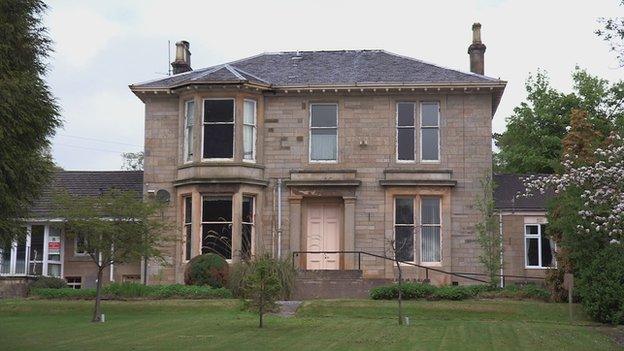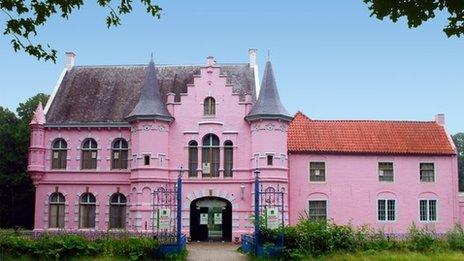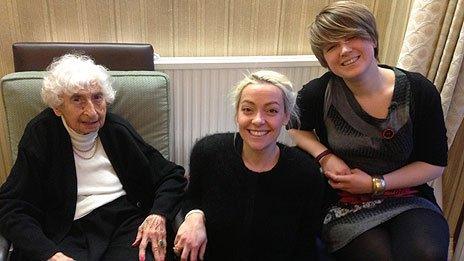The rise of the extreme house-sitter
- Published

Sam Van Gelder lives in a Scottish mansion
In the current tough economic climate, with rents rising, people are finding unusual ways to cut back on living costs while they save up for a deposit on a place of their own.
To let: One 35-bedroom Victorian mansion in Helensburgh, picturesque location in the middle of the countryside, 50-minute train journey to Glasgow. Rent: £180 a month, including bills.
It sounds too good to be true, but for 26-year-old call centre worker Sam Van Gelder, this estate is home. With these low living costs, he has already saved more than £3,000 to put towards a deposit on a home of his own.
Van Gelder is a property guardian and lives in the mansion, which is currently up for sale, with the aim of deterring vandals, burglars, metal thieves and squatters from targeting the property. In exchange he gets an affordable monthly rent and unique living space.
The property was a former old people's home and has been left exactly as it was when its elderly residents moved out. There is a stair lift, massage table and reclining chairs in the large lounge where Van Gelder watches television in the evening.
Living in a disused old people's home on your own in the middle of nowhere can feel a little eerie, says Van Gelder, and there are some basic rules you have to adhere to as a property guardian - like not hosting any parties.
"There are pros and cons, so you get a large living room and you get a lot of space to live in but you have to take care of it."
There are many firms specialising in property guardianship, such as Ad Hoc and Newbould Guardians. Paul Cosnett, regional manager at Camelot Property Management, a company that provides housing to about 10,000 people in Europe in otherwise disused or vacant buildings, says there are a few minimum requirements for would-be property guardians. They have to be over 18 years old, have a regular income stream and no criminal convictions.

House-sitters can also stay in hospitals
"All we ask them to do is to live there like they would their own home, so check your windows and doors are secure at night. We don't ask them to go patrolling outside or anything like that - just to live at the building, keep it secure, and do a bit of tidying up."
Any property can be inhabited as long as it is wind and watertight and has an electricity and water supply. Some argue that the guardianship firms are breaching building regulations, external. They deny this.
Camelot has some very distinctive properties on their books - from hospitals, pubs, schools, fire and police stations, observatories, former children's homes and park keepers' cottages to priories, an abbey and hermit lodges situated in the middle of huge estates. They even have a theme park.
"In Holland, we've still got what's called the Pink Castle," says Cosnett.
"It's sort of an equivalent of Alton Towers. We did have one in the UK some years ago on a smaller scale. It's bright pink, a well-known traditional site. [Property guardians] live in the actual castellation part where there's all manner of bedrooms in the spire of the castle.

Guardians can live like princes and princesses in the Pink Castle in Holland
"Imagine sleeping beauty's residence, they're living in that."
Cosnett says that since the recession there has been an upsurge in the number of people interested in property guardianship - with a 40-50% growth in the Midlands and about 30% growth in London. They now have waiting lists for properties close to city centres in London, Birmingham, Manchester and Liverpool.
"We find strangely after the Christmas holidays, we have an upturn in guardians," says Cosnett, "because a lot of potential guardians come to us that have split up from relationships following the holiday season break."
It is estimated that there are about 920,000 empty homes across the UK and rather than allow an empty property to rot or be boarded up, property guardians let owners save on the cost of security.
Van Gelder will be joined by other guardians in the mansion. Living together in a shared building often creates guardian communities in which mansion-mates share the cooking or costs of additional expenses like satellite television.
Property guardianship is not the only affordable housing scheme that has seen a surge in interest. Customer bookings manager Naomi Lumsdaine, who's 27, has found her perfect housemate. She is cultured, entertaining, well-educated and fun - and 97 years old.

Naomi Lumsdaine (far right) lives with Anne Schotts (far left)
Lumsdaine lives with Anne Schotts in central London in a four bedroom house. She pays £100 a month to a for-profit agency who set up the arrangement, known as Homeshare, but no rent to Schotts.
Homeshare is an initiative in which the householder provides the homesharer with accommodation in exchange for help - this can range from doing some minor household tasks like gardening or helping to use technology, such as a computer, to providing company. Many homeshare schemes are run by voluntary bodies or charities.
Alex Fox, chief executive of Shared Lives Plus, the national network for 12 homeshare schemes in the UK says there are about 150-200 people formally using this arrangement, with new schemes currently being set up in places like Cumbria, Oxford and Plymouth.
He says home sharers often find they enjoy getting to know someone outside of their normal social circle.
"We've got an epidemic of isolation and loneliness among older people," says Fox. "and you've often got older people who are struggling to afford or find the right kind of support but who do have spare rooms in their houses, and younger people who are increasingly trying to get on the housing ladder."
After a screening process, criminal records check and meeting with Schotts to check they would get along, Lumsdaine moved in and has lived there for the last five months.
"Literally I'm there to make sure that she's OK if, heaven forbid, she does have a fall," says Lumsdaine, "because I'm in and out every day and I'm there to help handle the whole thing."
She does 10 hours of chores a week which include cooking dinner and washing up and also "hangs out" with her housemate.
"Dinner time is one of my favourite times of day. We'll sit and chat and we always have fruit afterwards," says Lumsdaine. "She buys the fruit and we eat it together and it's a very specific thing. We have to count the strawberries and have exactly the same amount. If it's odd we have to divide one in half."
Schotts does not want to live in a care home, but needs some extra support and so the arrangement gives her family peace of mind. The initiative has provided Lumsdaine with a set routine and she is using the money she saves to pay off debts and save for a deposit on her own home. She says it has enriched her life and turned out to be the perfect way to live.
"I've got the companionship of a really wonderful elder. I genuinely mean it when I say she is the best housemate I've ever had because she's no trouble at all."
You can follow the Magazine on Twitter, external and on Facebook, external
Do you regularly house-sit? Use the form below, tweet us, external or leave a Facebook comment, external.
- Published28 January 2011
- Published1 August 2012